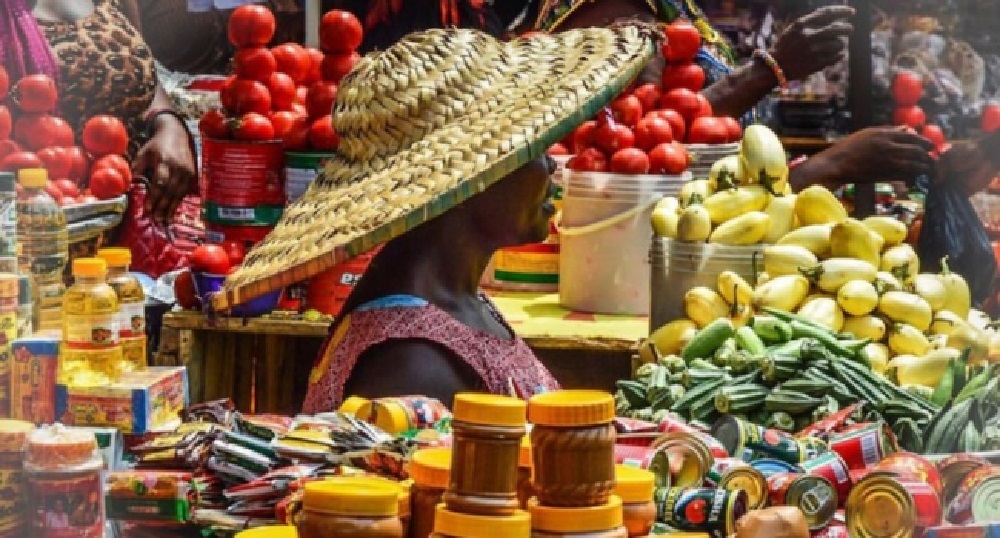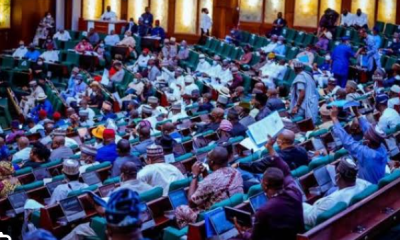Economy
Inflation surged to 24.23% due to escalating cost of living

Inflationary pressure has reappeared as Nigerians grapple with increases in average costs of basic food items and energy.
For the first time after the rebasing of the Consumer Price Index (CPI), headline inflation spiked in March to 24.23 per cent – 105 basis points above the 23.18 per cent recorded in the previous month.
The National Bureau of Statistics (NBS) yesterday indicated that the rate of increase in the average price level was higher in March than the level in February.
In January, the NBS updated the weight and price reference periods in calculation of the CPI to make the inflationary gauge more reflective of changes in consumption patterns and the economy generally.
The rebasing did not only brought the base year closer to the current period from 2009 to 2024, it also introduced some critical methodology changes to improve the computation processes.
After the rebasing, inflation dropped from 34.80 per cent in the pre-rebased period of December 2024 to 24.48 per cent in January 2025. It dropped further to 23.18 per cent in February.
In its latest report, NBS recorded 186 basis points changes between the monthly inflation rate, with the month-on-month rate rising from 2.04 per cent in February to 3.90 per cent in March.
The NBS attributed the spike to the rise in costs of food and alcoholic beverages, fuels and electricity, among other items.
Analysts at CardinalStone said the resurgence was due to renewed foreign exchange (forex) pressures amid heightened global risk-off sentiment.
They pointed at foreign portfolio investments (FPIs) outflows and increased dollar demand, which saw naira dropping by 2.4 per cent in March.
Experts also cited increase in price of Premium Motor Spirit (PMS) or petrol, following the temporary suspension of the naira-for-crude swap arrangement.
Food inflation rate stood at 21.79 per cent in March 2025. The composite food index decreased to 21.79 per cent from 23.51 per cent.
Core inflation, which excludes volatile agricultural produce prices and energy, rose to 24.43 per cent from 23.01 per cent.
Specifically, the month-on-month food inflation rose by 50 basis points from 1.67 per cent in February to 2.18 per cent in March.
The NBS attributed the increase in food inflation to increases in the average prices of basic food items including ginger, garri, broken rice, honey, crabs, potatoes, plantain flour, periwinkle and pepper amongst others.
On a state-by-state basis, food inflation was higher in Oyo with 34.41 per cent; Kaduna (31.14 per cent) and Kebbi (30.85 per cent).
On the other side, the 9.61 per cent recorded by Bayelsa; Adamawa (12.41 per cent) and Akwa Ibom (12.60 per cent), were the lowest inflation rates.
Analysts expressed concerns that the resurgent inflationary pressure might lead to renewed tightening stance by the Central Bank of Nigeria (CBN).
CBN Governor Dr. Olayemi Cardoso, had at the end of the first Monetary Policy Committee (MPC) meeting in 2025, reiterated the apex bank’s commitment to orthodox monetary policies, noting that the apex bank’s stance will be reflective of the inflationary trend.
With inflation rate dropping in February, the MPC had decided to maintain all key monetary policy parameters, including the Monetary Policy Rate (MPR) at 27.50 per cent, the asymmetric corridor around the MPR at +500/-100 basis points, the Cash Reserve Ratio (CRR) at 50.00 per cent for Deposit Money Banks and 16.00 per cent for Merchant Banks, and the Liquidity Ratio at 30.00 per cent.
Clarifying the impact of the rebased CPI, Cardoso had explained that the lower inflation figure should not be misinterpreted.
He underlined the need to analyse more data before drawing comparisons, noting that the CBN is currently assessing the figures and will provide further guidance in due course.
The CBN boss stressed the critical importance of collaboration between monetary and fiscal authorities in sustaining recent economic improvements.
Addressing concerns about the impact of elevated borrowing costs on economic growth, the CBN governor assured that the apex bank’s primary objective is to stabilize the foreign exchange and financial markets.
He expressed confidence that such stability would attract increased foreign investments, stimulating the much-needed economic growth.
Cardoso also highlighted the competitiveness of the Nigerian currency, which has spurred growing interest from international investors.
Economy
SEE Current Black Market Dollar (USD) To Naira (NGN) Exchange Rate

Current Black Market Dollar (USD) To Naira (NGN) Exchange Rate
As of Thursday, May 15, 2025, the exchange rate of the United States Dollar (USD) to the Nigerian Naira (NGN) in the Lagos parallel market, commonly referred to as the black market, stands as follows:
Buying Rate: ₦1,625 per $1
Selling Rate: ₦1,630 per $1
These rates were sourced from key operators within the Bureau De Change (BDC) segment of the market and may fluctuate depending on demand, location, and volume of the transaction.
Important Disclaimer from the Central Bank of Nigeria (CBN)
The Central Bank of Nigeria has repeatedly cautioned against the use of the parallel market for foreign exchange transactions. The apex bank maintains that the official forex market is the only recognized channel for buying and selling foreign currency. Individuals or businesses in need of foreign exchange are strongly advised to approach their respective commercial banks or authorized dealers.
Official CBN Exchange Rate – May 15, 2025
In contrast to the rates observed in the black market, the official rates published by the CBN on the same date are:
Highest Rate: ₦1,604 per $1
Lowest Rate: ₦1,597 per $1
These rates reflect the regulated interbank market and may differ from bank-to-bank or based on transaction purposes such as international payments, imports, and remittances.
It’s important to note that the foreign exchange rates quoted here are indicative and may not reflect the exact rates offered to individuals or businesses at any given moment. Factors such as the location of exchange, prevailing market conditions, transaction volume, and negotiations between parties can lead to slight variations.
Final Thoughts
As the Naira continues to fluctuate against the Dollar, both in the official and unofficial markets, it is crucial for individuals and businesses to monitor exchange rate trends closely. For the most accurate and up-to-date rates, always consult authorized BDC operators or your local bank.
Economy
SEE Current Black Market Dollar (USD) To Naira (NGN) Exchange Rate

Current Black Market Dollar (USD) To Naira (NGN) Exchange Rate
As of Tuesday, May 13, 2025, the exchange rate for the U.S. dollar to the Nigerian naira at the Lagos Parallel Market commonly known as the black market or Aboki FX—stands as follows:
Buying Rate: ₦1,630 per dollar
Selling Rate: ₦1,635 per dollar
This information is based on data obtained from traders at Bureau De Change (BDC) outlets in Lagos.
Important Notice:
The Central Bank of Nigeria (CBN) does not recognize the black market as an official channel for foreign exchange transactions. Individuals and businesses seeking to access forex are advised to go through authorized financial institutions, such as commercial banks.
Dollar to Naira – Black Market Rate Today
Exchange Type Rate (₦)
Buying ₦1,630
Selling ₦1,635
Dollar to Naira – CBN Official Rate
At the Central Bank of Nigeria’s official window, the dollar exchanged at varying rates today:
Highest Rate: ₦1,610
Lowest Rate: ₦1,597
Note:
Foreign exchange rates may differ depending on location, volume, and the dealer. The figures provided here are for informational purposes and may not reflect the exact rates offered to buyers or sellers in real-time.
Economy
CBN launches new platform, targets $1bn monthly diaspora remittances

The Central Bank of Nigeria, in collaboration with the Nigeria Inter-Bank Settlement System, has launched the Non-Resident Bank Verification Number platform, an initiative aimed at enhancing financial access for Nigerians in the diaspora.
The platform, which enables Nigerians abroad to obtain their Bank Verification Number remotely, removes the need for physical presence in Nigeria.
Speaking at the event in Abuja on Tuesday, CBN Governor, Mr. Olayemi Cardoso, described the platform as a key milestone in the country’s financial inclusion journey.
He noted that the NRBVN would ease the long-standing challenges faced by Nigerians in the diaspora who previously had to be physically present in Nigeria for BVN registration.
“For too long, many Nigerians abroad have faced difficulties accessing financial services at home due to physical verification requirements,” Cardoso said. “The NRBVN changes that. Through secure digital verification and robust Know Your Customer processes, Nigerians worldwide will now be able to access financial services more easily and affordably.”
The governor added that the NRBVN was not just a solution for financial access, but a step towards a more inclusive, innovative, and prosperous financial ecosystem.
“We are building a secure, efficient, and inclusive financial ecosystem for Nigerians globally,” he remarked. “This platform is not just about financial access, it’s about national inclusion, innovation, and shared prosperity.”
Cardoso also highlighted the growth in remittance flows, which increased from $3.3bn in 2023 to $4.73bn in 2024. He attributed this rise to recent reforms, including the introduction of the willing buyer, willing seller FX regime.
With the launch of the NRBVN, the CBN is targeting $1bn in monthly remittances.
“With the introduction of NRBVN and complementary policy measures, we are optimistic about achieving our ambitious target of $1bn in monthly remittance flows, a goal we believe is entirely achievable given the growing trust and convenience in formal remittance channels,” Cardoso said.
The event also featured a presentation by the Managing Director/CEO of NIBSS, Mr Premier Oiwoh, who detailed the technical and operational aspects of the NRBVN platform.
Oiwoh emphasised that the platform adheres to global standards, incorporating stringent Anti-Money Laundering and KYC compliance protocols to ensure transparency and security.
The Deputy Governor, Economic Policy, CBN, Mr Muhammad Abdullahi, also addressed the gathering, describing the NRBVN as a transformative tool for enhancing the banking experience for Nigeria’s diaspora.
He urged stakeholders to collaborate in refining the platform to meet the evolving needs of the diaspora community.
He further emphasised that the initiative would strengthen economic ties between Nigeria and its global citizens, and ultimately drive sustainable economic growth.
“Together, we stand at the threshold of a new era, poised to deepen the trust, enhance remittance growth, and forge a stronger, more meaningful connection between Nigeria and its global citizens,” Abdullahi said.
The NRBVN platform is part of a broader framework that includes the Non-Resident Ordinary Account and Non-Resident Nigerian Investment Account, which provide Nigerians in the diaspora with access to savings, mortgages, insurance, pensions, and investment opportunities in Nigeria’s capital markets.
Under current regulations, diasporans will have the flexibility to repatriate the proceeds of their investments.
The launch of the NRBVN platform marks a crucial step in the CBN’s efforts to improve financial inclusion and harness the economic potential of Nigeria’s diaspora.
-

 News23 hours ago
News23 hours agoAlleged cyber bullying: IGP re-arraigns VDM
-

 News21 hours ago
News21 hours agoBill To Make Voting Compulsory For Nigerians Passes Second Reading
-

 News4 hours ago
News4 hours agoINSECURITY! Ten killed in Plateau over attack linked to cattle rustling, farm destruction
-

 Health12 hours ago
Health12 hours agoLassa fever claims 138 lives in 2025, cases spread to 18 states – NCDC
-

 Economy7 hours ago
Economy7 hours agoSEE Current Black Market Dollar (USD) To Naira (NGN) Exchange Rate
-

 News12 hours ago
News12 hours agoNkechi Blessing Confirms Break Up With Lover
-

 News21 hours ago
News21 hours ago32.9kg cocaine trafficking: 10 Thai sailors, ship convicted, fined $4.3m(Photos)
-

 News11 hours ago
News11 hours agoCourt nullifies Edo LG chair, deputy’s impeachment




